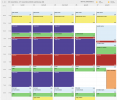Hello everyone,
since i started using GTD for my work organization I encountered a friction when i was called to assign context and clarify. When I'm not visiting customer I sit in my office in front of my computer and 95% of my work related task imply with computer use. So 60/70% of task got piled in the same list and I was not really using context at all to organize my work. I tried using few contex, many context and fancy context but i always fin iced doing task using my memory and this way I was late with important task from time time.
My boss (the best boss you could ever have) is using Time Blocking since I know him and he is really impressive: he manages up tp 15 projects and wears few vice-president hats and never miss a task or a deadline or simply forgot to give feedback for anything regardless the way it have been as originally comunicated (e-mail, calls, teams, chat or meetings..).
So I was giving look at some material he gave me but I could not get the usefulness to fill your day with uncertain lasting task calendar events.
Then I realized what my boss does: he uses time blocks as context and during the reserved time he works only on certain task that fit in the "context" forcing himself to divided the time in front of the computer in specific scope oriented blocks.
So i did a few changes in my GTD system using the activities done in front of the computer as context:
@project (time reserved in 2 slots every day) reserved to work on projects task
@e-mail and teams (time reserved in 3 slot every day to read messages and replying)
@hands-on (time reserved 2 times for week to work testing and practicing with new functionalities of our product that's a software)
@tecnical (time reserved once for week to read and watch internal technical documentation)
@free task (time reserved once everyday to complete 5 min task like home-banking, buying online stuff, and other important task both for work and for private life)
@calls (time reserved 2 times each day to make calls)
@relax (time reserved in 2 small blacks and a longer one) to fit chats with colleagues, a good coffee and my daily workouts and social media
So every week I assign to deep work blocks specific context (@project, @hands on and @tecnical) to distribute according to deadlines and workload and day out of the office. This way i still use the GTD approach to choose task but I reserve specific time to to complete task that often were delayed to much
Any suggestion opinion or experience with time blocking is welcome!
since i started using GTD for my work organization I encountered a friction when i was called to assign context and clarify. When I'm not visiting customer I sit in my office in front of my computer and 95% of my work related task imply with computer use. So 60/70% of task got piled in the same list and I was not really using context at all to organize my work. I tried using few contex, many context and fancy context but i always fin iced doing task using my memory and this way I was late with important task from time time.
My boss (the best boss you could ever have) is using Time Blocking since I know him and he is really impressive: he manages up tp 15 projects and wears few vice-president hats and never miss a task or a deadline or simply forgot to give feedback for anything regardless the way it have been as originally comunicated (e-mail, calls, teams, chat or meetings..).
So I was giving look at some material he gave me but I could not get the usefulness to fill your day with uncertain lasting task calendar events.
Then I realized what my boss does: he uses time blocks as context and during the reserved time he works only on certain task that fit in the "context" forcing himself to divided the time in front of the computer in specific scope oriented blocks.
So i did a few changes in my GTD system using the activities done in front of the computer as context:
@project (time reserved in 2 slots every day) reserved to work on projects task
@e-mail and teams (time reserved in 3 slot every day to read messages and replying)
@hands-on (time reserved 2 times for week to work testing and practicing with new functionalities of our product that's a software)
@tecnical (time reserved once for week to read and watch internal technical documentation)
@free task (time reserved once everyday to complete 5 min task like home-banking, buying online stuff, and other important task both for work and for private life)
@calls (time reserved 2 times each day to make calls)
@relax (time reserved in 2 small blacks and a longer one) to fit chats with colleagues, a good coffee and my daily workouts and social media
So every week I assign to deep work blocks specific context (@project, @hands on and @tecnical) to distribute according to deadlines and workload and day out of the office. This way i still use the GTD approach to choose task but I reserve specific time to to complete task that often were delayed to much
Any suggestion opinion or experience with time blocking is welcome!

